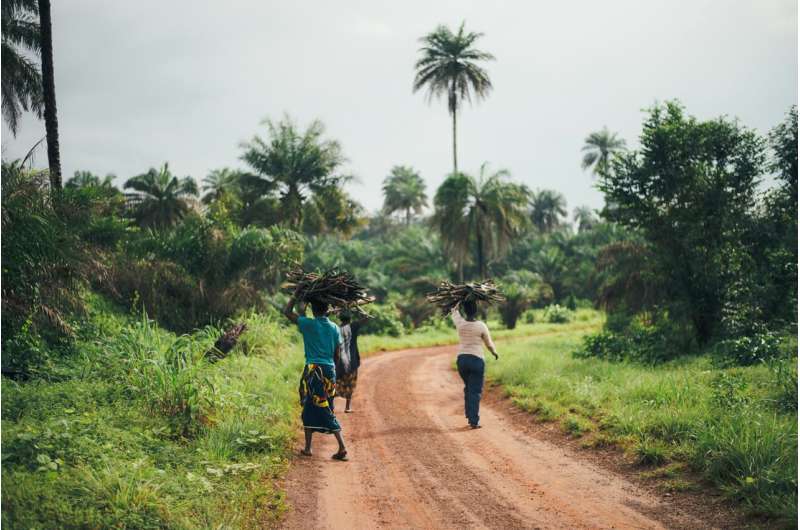This article has been reviewed according to Science X's editorial process and policies. Editors have highlighted the following attributes while ensuring the content's credibility:
fact-checked
trusted source
proofread
The effects of climate variability on children's migration and childcare practices in sub-Saharan Africa

Shifting weather caused by climate change, especially drought and heat, is linked to a rise in the number of children being raised outside of their biological parents' households in sub-Saharan Africa, according to a study led by researchers at Penn State. The findings highlight the effects climate change may have on children and social support systems, researchers said, a question that has received relatively little attention from researchers and the policy community.
The researchers found that when households in sub-Saharan Africa experienced less than typical precipitation in the year prior—droughts, in many cases—they were less likely to add a foster child to their household. Among the households with the most children, precipitation deficits also increased the likelihood a child would be out-fostered—sent to live in another household. Heat stress was also associated with changes in children's living arrangements, reducing the likelihood that better-off households would in-foster children.
In many parts of Africa, fostering is a common and often informal practice, the researchers said, with children living with families other than their biological parents for anywhere between a few months and several years. Fostering can serve several purposes, including to help children access better educational opportunities, to reduce the resource demand in the sending household and to provide labor to the receiving household.
This study, published in the journal Population and Environment, suggests that environmental stressors can shape many of these incentives and opportunities across the region. The paper also received an award for the best graduate-student-led paper from the University of Minnesota's IPUMS program.
Co-author Brian Thiede, associate professor of rural sociology, sociology and demography in Penn State's College of Agricultural Sciences, said these findings may reflect the fact that droughts can constrain household resources, which incentivizes moving children to other households and reduces the likelihood that even better-off households will want to host an additional child.
"We knew that child fostering—the transfer of children from one household to another—is used in some contexts to adapt to economic stress," Thiede said. "It therefore seemed plausible to expect the effects of climate shocks to affect fostering."
He added that while previous work has shown that climate change can influence children's health and education, these new findings suggest that it also may influence whether they remain in their household of birth.
"In some cases, parents might decide to foster their children out to other households as a way to increase the children's chances for education and nutrition, among other outcomes," Thiede said. "So, when fewer households take in those fosters, these children may lose those opportunities."
As climate change shifts temperature patterns and increases the chances of severe weather events around the globe, the researchers said there has been significant interest among academics and policymakers in how climate change may displace populations and increase migration.
Most of the studies on this topic have focused on the migration of working-age adults, with much less attention given to mobility among other populations, such as children, Thiede said. But understanding whether and how environmental stressors can affect child fostering is important, he added, since fostering is associated with many aspects of children's well-being, including their health and education.
For the study, Thiede teamed up with Sara Ronnkvist, lead author on the paper and now a doctoral student in sociology at the University of Wisconsin-Madison, who he mentored through the 2019 Drawdown Scholars Program hosted by Penn State. They were joined by Emma Barber, who graduated from Penn State in 2020 with a bachelor of science in community, environment, and development and who worked on the project with the support of an undergraduate research award from the College of Agricultural Sciences.
The team analyzed nationally representative data on 23 sub-Saharan African countries from the U.S. Agency for International Development's Demographic and Health Surveys (DHS), which included information on demographics, health and nutrition among households included in the program.
They also used DHS birth records and household roster data to find the number of children fostered out to other families, as well as the number of children taken in by foster families. Finally, the researchers combined these data with detailed temperature and precipitation records for each of the communities covered by their dataset.
Thiede said the findings underscore the need to think more critically about how climate change may affect migration as weather patterns continue to evolve.
"While popular theories suggest that climate change will lead to large-scale population displacements, the empirical evidence suggests that impact will vary widely across groups," he said. "How and whether these displacements happen will depend on whether migration increases or decreases, how far those who migrate move and the needs of impacted individuals."
The researchers said future studies could continue to build on their findings by studying how climate-related changes in fostering patterns affect children's health and education. They also emphasized the need to study how social protection policies could reduce the hardships associated with environmental change and improve outcomes among the children who continue to live in kinship care arrangements.
More information: Sara R. Ronnkvist et al, Child fostering in a changing climate: evidence from sub-Saharan Africa, Population and Environment (2023). DOI: 10.1007/s11111-023-00435-2
Provided by Pennsylvania State University





















